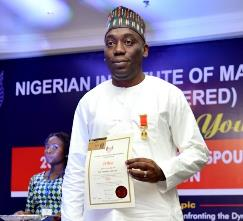Stakeholders in the maritime industry have identified the hiccups in the involvement of Nigerians in the attainment of the purpose for the establishment of the African Continental Free Trade Agreement (AfCFTA).
The stakeholders who took turns to speak at the just concluded second edition of the Maritime Reporters’ Association of Nigeria (MARAN) Annual Maritime Lecture (MAMAL) in Lagos also provided insight on how Nigerians can fully participate just as they proffer solutions.
Several stakeholders in the maritime sector and beyond participated in the annual MAMAL event with the theme: “AfCFTA – Dismantling Barriers, Navigating Regional Trade.
Deputy Registrar, Liberian Maritime Authority (LMA), Dr. Anthony Onoharigho described transportation and logistics as key sectors that will help the country achieve the objectives of AfCFTA).
His words: “The transport sector is undermined. To move goods within the country is a problem not to talk about Africa. We need to make things seamless by removing barriers. We have a competitive advantage by being producers of oil in the country but the constraint is that we do not have vessels to move the crude oil outside the country”.
On his part, a member of the United Nations Committee on Trade and Transport Location, Dr. Alban Igwe noted that Nigeria had all the opportunities to be a logistics hub if all the barriers are removed.
He averred that there was need to dismantle everything that was pulling the country back so that it could get its share of the global cake.
“Todays’ conversation is very important. It is a wakeup call for Nigeria as the country is under a global threat. Other African blocs are doing well while Nigeria is struggling,” he said.
The Executive Director, Operations and Technical Services, Tantita Security Services Nigeria Limited (TSSNL), Captain Warredi Enisuoh noted that with AfCFTA, a future exists for manufacturers in the country.
He enjoined manufacturers of goods in the country to start thinking about carbon registry, pointing out that if Nigerians could organise themselves for this, they could have a National Carbon Credit to their benefits.
While making his own inputs, a maritime security expert, Mr. Emmanuel Maiguwa urged the Ministry of Marine and Blue Economy to ensure that customs duty on vessel acquisition was removed instead of focusing on the resuscitation of the national shipping line.
In his words: “We cannot trade in Africa using our roads successfully and so the need to make acquisition of vessel to be cost effective, all barriers hindering the acquisition of vessel should be eliminated”.
The President, Nigerian Ship Owners Association, Mr. Sola Adewunmi noted that the lecture was a good development but wondered how prepared was Nigeria to be fully involved in AfCFTA.
Adewunmi who was the chairman of the occasion said that people are losing money due to bad policies and inadequate funding.
According to him, for Nigeria to be a virile shipping nation, incentives should be given to indigenous ship owners.
The President, MARAN Mr. Godfrey Bivbere in his welcome address, noted that by breaking down barriers hindering AfCFTA and fostering closer economic ties, the country would pave the way for unprecedented opportunities, growth and prosperity.
His words: “Today’s discussion will explore how the country can collectively tackle challenges, leverage opportunities presented by AfCFTA, and position Nigeria and Africa at large to benefit from the estimated $3.4 trillion trade opportunities. To maximize the benefits of AfCFTA, Nigeria must address critical requirements such as improved trade infrastructure, efficient procedure, capacity building, investment in maritime assets and leveraging technology and innovation to facilitate trade.
“Intra-Africa trade currently stands at just 10 per cent. With AfCFTA, there are projections to raise this to 20 per cent and for this to happen, we must ensure free and efficient movement of goods across borders through vehicles, railways, ships and trucks”.











